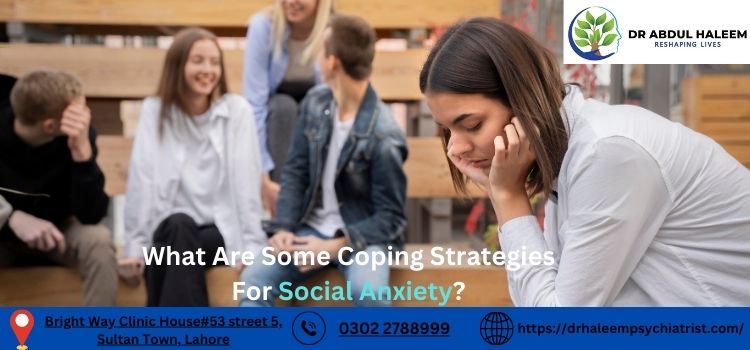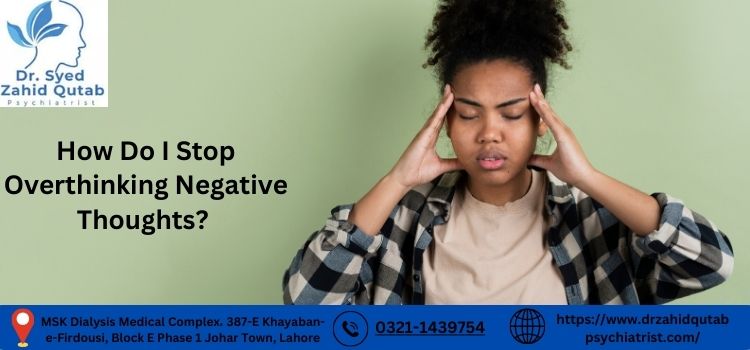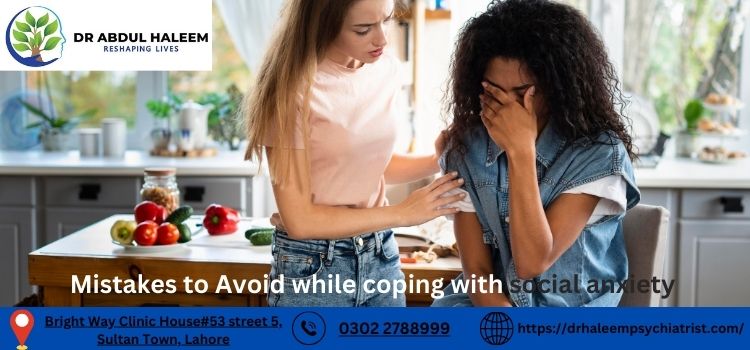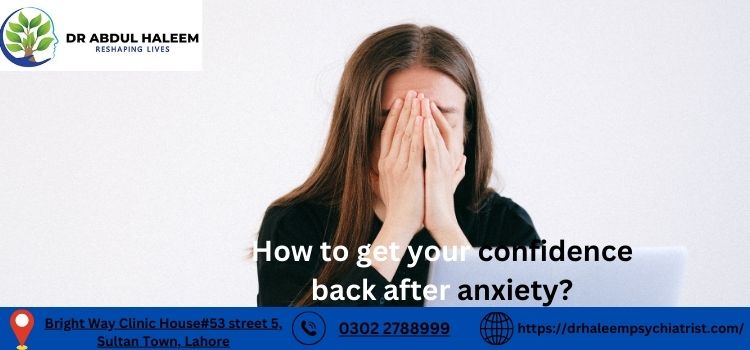Are you facing social anxiety? This situation can be overwhelming and debilitating but you do not need to feel weak against it. Many patients do not know about what are some coping strategies for social anxiety.
You have to set a plan for dealing with social anxiety as it is an important part of your mental health journey. You should learn coping strategies that work for you, it can help to make your daily life more manageable.
Read more to get further details.
What Are Some Coping Strategies For Social Anxiety?

Some of the coping strategies for managing social anxiety are:
1. Cognitive Behavioral Therapy (CBT):
CBT is a form of therapy that helps to recognize and change your negative thoughts. It involves the strategies to identify the pattern of your thinking. CBT also helps to understand how your thinking affects your behavior and change it to more helpful thinking patterns. It can help you to reduce your social anxiety.
2. Exposure Therapy:
Exposure therapy can help reduce social anxiety. In this type of therapy, a person exposes himself to the situation or activities that cause him anxiety. When this exposure repeats continuously it teaches you to manage the anxiety related to social situations. This can help you to feel more comfortable in those areas where you feel anxiety earlier.
3. Mindfulness:
Mindfulness involves becoming aware of the present moment without judging or criticizing yourself. It can be helpful for managing stress, anxiety, and negative thoughts. Practicing mindfulness can also lead to improved self-awareness and acceptance of the present moment, which can help to reduce social anxiety.
4. Physical Activity:
Physical activity is a great way to manage stress and anxiety. Exercise helps improve your mood by releasing endorphins, hormones that make you feel happy. Regular physical activity can also boost your self-confidence and reduce feelings of social anxiety.
5. Talk to Someone:
If your social anxiety is impacting your daily life, it might be helpful to talk to a mental health professional. A psychologist will be able to provide you with strategies for managing your anxiety and offer support as you work on overcoming feelings of fear and worry. Talking to someone can also help to reduce feelings of loneliness and isolation associated with social anxiety.
6. Positive Self-Talk:
Positive self-talk can be an effective tool for managing social anxiety. It involves talking to yourself positively and encouragingly. When you experience anxious thoughts, try to challenge them by speaking kindly to yourself. For example, if you find yourself feeling anxious about taking on a new challenge, you might try saying something like “I can do this!” or “I have the skills and confidence to take on this task.”
7. Practice Relaxation Techniques:
Relaxation techniques can be an effective way to help manage social anxiety. Deep breathing exercises, progressive muscle relaxation, and visualization are all great options to help reduce physical and mental tension. Taking a few minutes each day to practice relaxation techniques can be very beneficial for managing social anxiety.
8. Give Yourself a Break:
Social anxiety is a real struggle and it can be difficult to manage on your own. It’s important to remember that you are not alone in this, and it’s okay to take time for yourself when needed. Don’t be afraid to give yourself a break if needed and practice self-care when you can. Taking care of yourself is an important part of managing social anxiety.
9. Stay Positive:
Finally, staying positive and having a positive attitude can go a long way in helping to manage social anxiety. Remind yourself that you are capable and strong, and practice positive self-talk on days that feel particularly challenging. Focusing on the good can help to reduce stress and anxiety levels.
10. Journaling:
Keeping a journal can be an effective way to express your thoughts and feelings related to social anxiety without having to talk about them out loud. Taking the time each day to write down your thoughts is a great way to process what you are feeling and can be very therapeutic. Journaling is also a helpful tool for tracking your progress over time as you begin to use different coping strategies.
How to Reduce Negative Thoughts?

Negative thoughts can be a major trigger for social anxiety. While it’s important to acknowledge and work through your anxieties, it’s also important to try and focus on the positive instead of getting consumed by negative emotions.
To reduce negative thinking patterns, you can practice strategies like:
- Breaking down overwhelming tasks into smaller chunks
- Writing down positive affirmations
- Practicing deep breathing exercises
- Utilizing mindfulness and meditation techniques
- Talking to friends or family for support
- Engaging in activities that make you feel good.
Mistakes to Avoid while coping with social anxiety

When managing social anxiety, it can be easy to fall into unhealthy habits and patterns of behavior. Here are some common mistakes to avoid when coping with social anxiety:
- Avoiding situations that make you uncomfortable – While avoiding certain situations may provide temporary relief from feeling anxious, this can reinforce a pattern of avoidance that keeps you from facing your fears and learning healthier coping strategies.
- Over analyzing conversations – Taking conversations apart in your head afterward can be an unhelpful way to think about social interactions, and it can increase anxiety levels. It’s important to remember that no one is perfect and everyone makes mistakes.
- Focusing on the negative – It can be easy to focus on the negatives when you’re feeling anxious, but this can make the situation seem even worse. Instead, try to focus on the positives and remember that everybody has their own unique experiences and perspectives on social situations.
Remember: everyone is different and there is no one-size-fits-all approach to managing social anxiety. It’s important to take time to find what works for you and to practice self-care and kindness. With the right tools, managing social anxiety can become easier and more manageable over time.
Conclusion
Social anxiety can be overwhelming, but it doesn’t have to mean feeling powerless. Many patients do not know about what are some coping strategies for social anxiety.
There are many strategies available that can help you cope with and manage social anxiety. Whether it’s practicing mindfulness, talking to friends or family for support, engaging in activities that make you feel good, there are plenty of ways to help you feel more in control.
FAQs
Frequently asked questions by people are mentioned below.
What are 3 symptoms of social anxiety?
The most common symptoms of social anxiety include intense fear or worry about being judged by others, feeling embarrassed or self-conscious in social situations, and avoiding certain activities that involve interacting with other people.
What does social anxiety look like?
Social anxiety can manifest itself in different ways for different people. It can look like intense worry and fear about being judged or scrutinized by others, avoiding social situations, and having difficulty initiating conversations with unfamiliar people.
How do I fix social anxiety?
There is no one-size-fits-all solution to managing social anxiety, though there are a few steps that can be taken. These include seeking help from the best psychiatrist, practicing self-care activities such as mindfulness.
Do I have social anxiety or am I just shy?
Social anxiety and shyness are not the same. While shyness is a natural personality trait, social anxiety is a feeling of intense fear or worry about being judged by others.
What is Scopophobia?
Scopophobia is a type of social anxiety disorder that involves an irrational fear of being seen or watched by others. They may avoid going out in public or engaging in activities with other people entirely.


